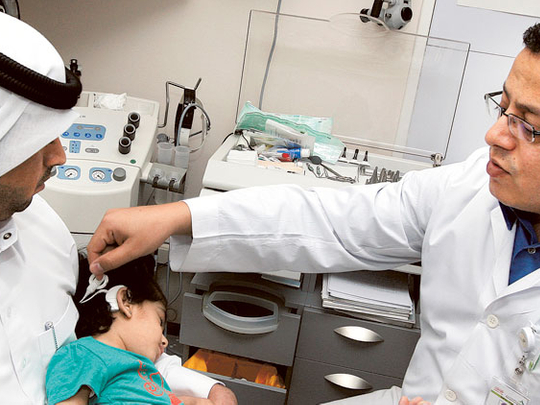
Dubai: The upsurge in the number of young children with hearing loss in Dubai is attributed to marriages between blood relatives, said doctors from the Dubai Hospital speaking exclusively to Gulf News.
At the hospital’s ENT unit, 20 of 24 patients who underwent surgery for profound hearing impairment in the past 18 months were children under the age of seven.
Hearing loss as a childhood disability significantly impairs opportunities of acquiring speech, language and social skills, according to the doctors. Hearing loss negatively affects educational and personal development.
The prevalence of hearing impairment — profound to severe — is estimated to be around three to six per 1,000 births globally, with UAE figures in the upper range.
The prevalence is driving the need for cochlear implants (CI) in patients as young as 12 months old — the age of eligibility.
The implant is a surgically implanted electronic device that restores a sense of sound in people who do not benefit from conventional hearing aids.
Dubai Hospital is recognised as a regional centre for cochlear implants and for training in the surgery.
Dr Hussain Abdul Rahman, Head of ENT, said marriages within the family or consanguinity increases the risk of hearing impairment.
He explained that consanguinity is a leading cause for hereditary hearing impairment. “There is a high prevalence of consanguinity among Arabs and other cultures from the Asian subcontinent due to their custom of interrelated marriage.”
He added, “The Dubai Hospital has performed 24 cochlear implant surgeries, of which 20 were on children. The hospital offers the most cost- effective implant package in the region Dh125,000 with three months rehabilitation, compared to private hospitals that charge 180,000 upwards.”
Dr Jamal Kassouma, consultant ENT surgeon and cochlear implant surgeon, said that hearing aids do not work in children who are severely hard of hearing.
“We consider implants for children who have severe to profound sensorineural hearing loss (nerve deafness) in both ears. A thorough evaluation is done by a multi-disciplinary team to determine candidacy. We use various diagnostic measures and strict selection criteria to confirm the need for a cochlear implant,” he said.
He explained, “Hearing aids only amplify sounds, but cochlear implants bypass damaged portions of the ear and directly stimulate the auditory nerve. An external component sits behind the ear and the second part is surgically implanted.”
The doctors from the hospital’s Audiology and Phoniatrics Units said that children who receive implants before 18 months displayed speaking ability close to that of their peers with normal hearing.
Dr Jamal Yousuf, who specialises in speech development said, “The earlier the diagnosis, the better — to ensure that a child with hearing loss doesn’t lag behind in speech and language development. Post-surgery, the child undergoes therapy to help him or her acquire speech, language, and social skills, which can take up to a few years.”
He added it is important for the parents to have realistic expectations and a high level of commitment for care and follow-up services.
Dr Mohammad Mustafa, audiologist, said, “During and after surgery, we look after the therapeutic needs including fittings, hearing therapy, and programming the cochlear implants so the child can hear sounds at the right decibel level.”












